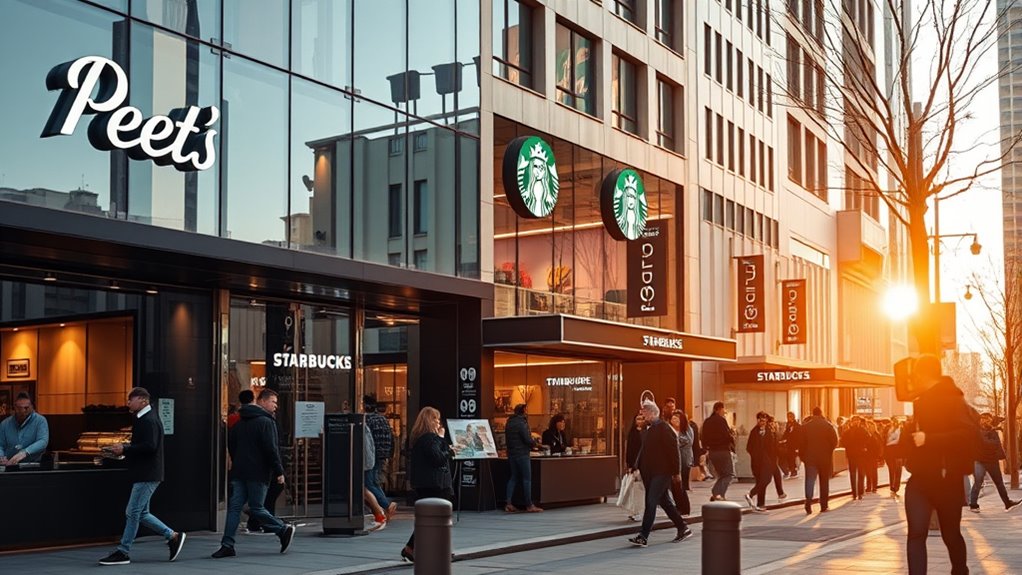The rise of coffee chains like Peet’s and Starbucks has transformed your coffee experience from local cafes to global phenomena. They expanded rapidly by opening outlets in high-traffic areas worldwide and tailoring their menus to regional tastes. Their focus on specialty brews and crafting unique coffee moments has set them apart. If you look closer, you’ll discover how these brands built a worldwide culture that continues to evolve and shape your daily coffee choices.
Key Takeaways
- Coffee chains like Peet’s and Starbucks expanded globally, establishing a strong brand presence in diverse markets.
- They shifted focus to specialty brews, elevating coffee to a premium experience and attracting loyal customers.
- Strategic market localization and innovative store designs helped chains deepen regional engagement and customer loyalty.
- Emphasis on quality, innovation, and craftsmanship differentiated these brands in a competitive, evolving coffee industry.
- Their global expansion and specialty focus have redefined coffee culture, making it accessible and exciting worldwide.

Have you noticed how coffee chains have taken over nearly every corner of the world? It’s impossible to ignore the way these brands have transformed the way we enjoy our daily caffeine fix. From humble beginnings, companies like Peet’s and Starbucks have expanded their reach far beyond their original locations, turning into global giants. Their growth isn’t just about opening more stores; it’s about creating a brand presence that resonates deeply with customers everywhere.
One key factor behind this expansion is their focus on specialty brews. These companies didn’t settle for just serving basic coffee; they innovated with unique blends and brewing methods that appeal to a more sophisticated palate. Starbucks, for example, introduced a variety of rich espresso drinks, teas, and seasonal beverages that encourage customers to explore different flavors. This emphasis on specialty brews helped elevate the coffee experience from a simple morning routine to a moment of indulgence. As a result, customers became more loyal, seeking out new and exciting options at every visit. The creation of these specialty offerings also allowed brands to stand out in a crowded market, turning a commodity into a craft.
Specialty brews transformed coffee from routine to indulgence, fostering loyalty and helping brands stand out in a crowded market.
At the same time, brand expansion played a vital role in their rise. These companies didn’t just settle for their initial locations; they strategically opened new outlets in high-traffic areas around the world. This aggressive expansion wasn’t random—it was calculated to maximize visibility and accessibility. As they grew, their branding became synonymous with quality and consistency, making their name recognizable in countless countries. This global presence helped solidify their reputation and attract diverse customer bases. Additionally, many of these brands employed market segmentation strategies to tailor their offerings to different regions, further fueling their growth.
The rise of these coffee chains also meant adapting to different markets, which often involved localizing their offerings. They introduced specialty brews that cater to regional tastes, blending global expertise with local preferences. This approach not only boosted their brand image but also deepened customer loyalty. The expansion of their brands was further supported by innovative store designs and digital platforms that fostered community and convenience.
Furthermore, their success can be attributed to the strategic use of brand expansion and consistent marketing efforts, which have helped them maintain a competitive edge in the evolving coffee industry. In essence, the growth of coffee chains like Peet’s and Starbucks shows how a focus on specialty brews combined with strategic brand expansion can turn a simple beverage into a worldwide phenomenon. They’ve redefined coffee culture, making it accessible, exciting, and continuously evolving. As a consumer, you’re part of this journey, experiencing the rich flavors and global reach of these brands every time you sip your favorite brew.
Frequently Asked Questions
How Did Local Coffee Cultures Influence Global Chain Expansion?
You see, local coffee cultures heavily influence global chain expansion by inspiring artisanal brewing techniques and emphasizing cultural integration. As chains expand, they adapt their offerings to reflect regional preferences, creating a unique experience for each community. This approach respects local traditions while introducing new flavors, making coffee more than just a beverage—it becomes a cultural connection. Your appreciation for these local influences helps shape the global coffee landscape.
What Ethical Concerns Surround the Rapid Growth of Coffee Chains?
You should consider that over 60% of consumers now prioritize ethical sourcing when choosing coffee. The rapid growth of coffee chains raises concerns about Fair Trade practices and labor conditions. Some companies may cut corners to expand quickly, risking fair wages and sustainable farming. As a consumer, you have the power to support brands committed to ethical standards, ensuring better treatment for workers and environmentally friendly practices.
How Do Coffee Chains Adapt to Diverse International Markets?
You adapt to international markets by customizing coffee flavor to local tastes and preferences, ensuring your offerings resonate with diverse consumers. Store design also plays a key role, so you incorporate cultural elements that appeal to each community while maintaining your brand identity. This approach helps you build connections, attract new customers, and succeed globally, all while respecting local customs and creating a welcoming environment.
What Innovations Have Coffee Chains Introduced to Attract Customers?
You see coffee chains innovate by introducing sustainable packaging, digital loyalty programs, and personalized experiences. They attract customers through eco-friendly practices, rewarding frequent visits with digital rewards, and customizing drinks to individual tastes. These strategies create engagement, foster loyalty, and differentiate brands in competitive markets. By combining sustainability with technology, they meet modern consumers’ preferences while enhancing the overall coffee experience.
How Do Coffee Chains Impact Small Local Coffee Businesses?
You might notice that coffee chains often overshadow small local coffee businesses, impacting independent competition. Their widespread presence can draw customers away, reducing sales for local shops. This shift influences local economic effects by potentially lowering community uniqueness and economic diversity. As a result, small businesses struggle to compete with the scale and marketing power of larger chains, making it harder for them to thrive in their neighborhoods.
Conclusion
So, next time you’re lost in a sea of frappuccinos and double shots, remember: you’re part of a global caffeine empire that’s turned your morning ritual into a billion-dollar spectacle. From humble beginnings to worldwide domination, these coffee chains have mastered the art of keeping you hooked—one overpriced latte at a time. Cheers to progress, or should we say, the great coffee con? Either way, your wallet’s feeling the buzz.









